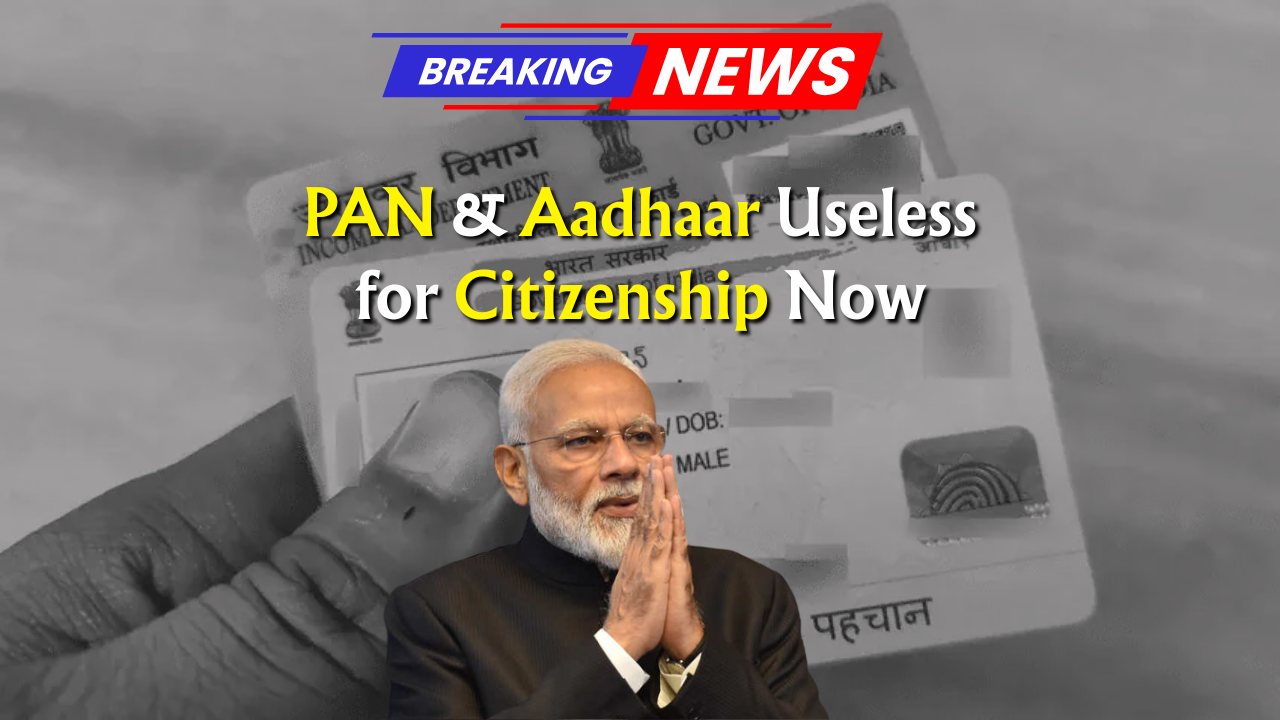Aadhaar & PAN Card : In a major policy change, the Government of India has announced that Aadhaar cards and PAN cards will no longer be accepted as proof of Indian citizenship. This shift has raised questions for millions of citizens who have long relied on these documents for identity verification. As per the new rules, only two specific documents will now be recognized to establish Indian citizenship, as part of a larger effort to streamline documentation and curb misuse.
Why Aadhaar & PAN Card Are No Longer Valid for Citizenship Proof
The Aadhaar and PAN cards are essential identity and financial documents, but the government has clarified that these are not conclusive proof of citizenship. The Ministry of Home Affairs stated that these IDs merely indicate residence or tax compliance and not legal citizenship.
Key Reasons Behind the Policy Shift:
- Aadhaar is issued to residents, not citizens.
- PAN is for income tax purposes and does not establish nationality.
- Increased cases of misuse by non-citizens.
- Push for tighter documentation under the Citizenship Act.
The Two Documents That Are Now Accepted as Proof of Citizenship
According to the latest guidelines, only the following two documents are accepted as valid proof of Indian citizenship:
- Birth Certificate issued by a government authority
- Indian Passport
These documents are deemed credible as they involve stricter verification processes and have clear linkage to citizenship status.
Accepted Documents for Citizenship Verification:
| Document Type | Accepted as Citizenship Proof | Issuing Authority | Required for Govt Schemes | Valid for NRC/CAA |
|---|---|---|---|---|
| Aadhaar Card | No | UIDAI | Yes | No |
| PAN Card | No | Income Tax Dept. | Yes | No |
| Voter ID | No | Election Commission | Yes | No |
| Driving License | No | RTO | Yes | No |
| Ration Card | No | State Govt. | Yes | No |
| Birth Certificate | Yes | Municipal Authorities | Yes | Yes |
| Indian Passport | Yes | Ministry of External Affairs | Yes | Yes |
Impact on Government Services and Schemes
This new rule will have a significant impact on various government processes including:
- Application for new government schemes
- Inclusion in National Population Register (NPR)
- NRC and CAA-related verifications
- Passport and visa issuance processes
People Most Affected by the New Rule:
- Migrants who do not have access to birth certificates
- Citizens without passports
- Senior citizens and rural residents with only Aadhaar or PAN
What You Can Do Now – Step-by-Step Guide
If you currently use Aadhaar or PAN as your primary ID, here’s what you should do:
- Check if you have a birth certificate or passport.
- If not, apply for a reissue or fresh document.
- Visit your local municipal office to obtain birth records.
- Apply for a passport online through the official portal.
Application Timeline Comparison:
| Document Type | Processing Time | Cost Range | Where to Apply |
|---|---|---|---|
| Birth Certificate | 7–15 days | ₹20–₹100 | Local Municipal Office |
| Passport | 7–21 days | ₹1,500–₹2,000 | Passport Seva Kendra (Online) |
Why This Matters for NRC, NPR, and CAA
The government’s move is directly linked to the proposed National Register of Citizens (NRC), the National Population Register (NPR), and the Citizenship Amendment Act (CAA). Reliable proof of citizenship will be essential to validate claims under these frameworks.
Legal Experts Say:
- This move aligns with global norms where citizenship is tied to birth and nationality documents.
- It will help prevent illegal claims and duplication in welfare schemes.
- However, it may lead to administrative hurdles for vulnerable populations.
Public Reaction and Political Debate
The policy has sparked a mixed reaction:
- Supporters argue it brings clarity and integrity to documentation.
- Critics say it could lead to harassment and exclusion, especially in rural areas.
Political Standpoints:
| Party/Group | Position on New Rule |
|---|---|
| Ruling Party | Supports – calls it a necessary reform |
| Opposition | Opposes – calls it discriminatory |
| Civil Rights Groups | Express concern over implementation |
The exclusion of Aadhaar and PAN as proof of citizenship is a major shift in India’s documentation framework. While it enhances the credibility of the process, it also creates new challenges for a large section of the population. Citizens are advised to take proactive steps to ensure they have valid documentation to avoid any disruption in accessing government services or proving their citizenship status.
